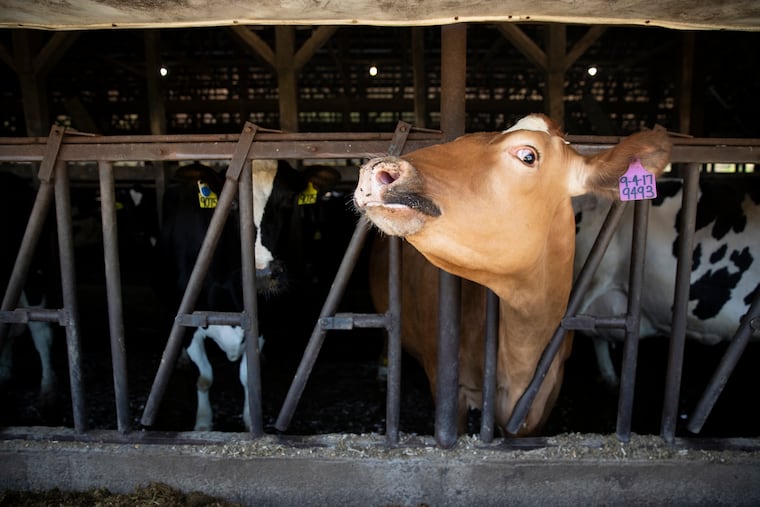Veterinarians rely on xylazine. They say a new Shapiro administration rule could jeopardize that in Pa.
Cattle veterinarians are especially concerned with the move because xylazine is the only sedative that works on cows.

HARRISBURG — Veterinarians around Pennsylvania are concerned that a new rule proposed by Gov. Josh Shapiro’s administration to mitigate the opioid epidemic will leave them unable to access a sedative necessary to treat animals.
Last month, Shapiro visited Kensington to announce he was directing the state Department of Health to schedule xylazine, also known as tranq, as a Schedule III controlled substance.
Xylazine is a legal veterinary sedative used to treat large animals such as horses and cattle. In recent years, however, the prescription animal drug has started showing up in Philadelphia’s illegal drug supply, mixed with heroin or fentanyl. In 2022, xylazine was found in about 90% of street drug samples Philadelphia’s health department tested.
Xylazine is not authorized for human use, does not respond to opioid overdose medications, and can leave users with slow-healing wounds that put them at risk for infection or amputation. What’s more: Xylazine was present in more than 550 fatal overdoses in Philadelphia over the last two years.
Shapiro, the state’s former top prosecutor, made the move in order to give law enforcement an additional tool and to decrease the spread of the drug on the street, calling it a “serious threat.”
However, veterinarians in Pennsylvania fear the move will have unintended consequences that put animal welfare at risk.
“We applaud the governor for his actions to combat this issue. At the same time, we want to make sure we have access to legal xylazine,” said Bill Croushore, the secretary and treasurer for the Pennsylvania Veterinary Medical Association, which has a membership of more than 3,200 veterinarians.
As a Schedule III drug, the state will mandate tighter record keeping, require the drug be stored in locked facilities, and give law enforcement the ability to prosecute people for illegally possessing and selling it. Manufacturers must also create additional checks to ensure that the person who ordered the drug is the one receiving it. Other Schedule III drugs include anabolic steroids and Tylenol with codeine, which are classified by the U.S. Drug Enforcement Administration as having moderate to low potential for abuse.
There are few manufacturers of xylazine in the United States. Veterinarians worry the rule will be too costly for manufacturers and distributors, pushing the necessary drug out of the market. Cattle veterinarians are especially concerned because xylazine is the only sedative that works on cows.
General anesthesia is the only alternative to xylazine for cattle, but it’s risky to use on the 1,500-pound animals, said Fred Gingrich, the executive director of the American Association of Bovine Practitioners. And with a declining number of veterinarians across the country, veterinarians often train farmers to administer the drug on their own for low-risk procedures like dehorning calves.
Few states have scheduled xylazine as a controlled substance. But such policies have already started to cause problems, Gingrich said.
Ohio Gov. Mike DeWine in March announced a similar rule. One major manufacturer does not have a DEA-approved facility and will no longer make the drug, Gingrich said. Another went out of business for an unrelated reason, leaving only one manufacturer in Ohio.
“Manufacturers just simply will not be able to comply, from a financial standpoint, with having this as a [controlled] substance,” Gingrich said.
Florida was the first state to schedule xylazine in 2016 as a Schedule I drug. Rick Sutliff, a past president of the Florida Veterinary Medical Association, told veterinary news service VIN News that the association didn’t even realize it was a controlled substance in the state until about six months ago and has had little effect on their work.
There is no evidence that veterinarians are providing the drug into the illegal drug stream. Federal law enforcement officials believe xylazine is often illegally purchased from Chinese suppliers, according to a 2022 joint report from the DEA and Justice Department.
In his initial announcement, Shapiro acknowledged that veterinarians aren’t the ones illegally trafficking the drug — and said his administration needs to find a way to guarantee access for them.
Shapiro’s press secretary, Manuel Bonder, said in an email that the administration has met with veterinarians before and after the announcement to “determine what approach best maintains veterinarians’ access to legal xylazine” and will urge manufacturers to keep producing the drug.
“Governor Shapiro is taking action to stop drug dealers harming our communities from acquiring xylazine, while preserving its important use on animals,” Bonder added.
The rule can still be changed before it goes into effect at the end of this month.
The Pennsylvania Veterinary Medical Association released a statement Friday thanking the Shapiro administration’s “quick action to hear our concerns and their willingness to work with us,” though they still hope that the administration withholds issuing a final rule change.
Instead, the Pennsylvania Veterinary Medical Association wants Congress to step in and enact federal legislation to protect veterinarians’ prescription use of the drug. U.S. Rep. Chrissy Houlahan (D., Chester) is a cosponsor of the bill.
If Pennsylvania doesn’t want to wait, the group wants the state to use the federal bill as a template for any future executive action.
“We hope they can find a way to do both: keep it available, and increase penalties for illicit use,” Croushore said.